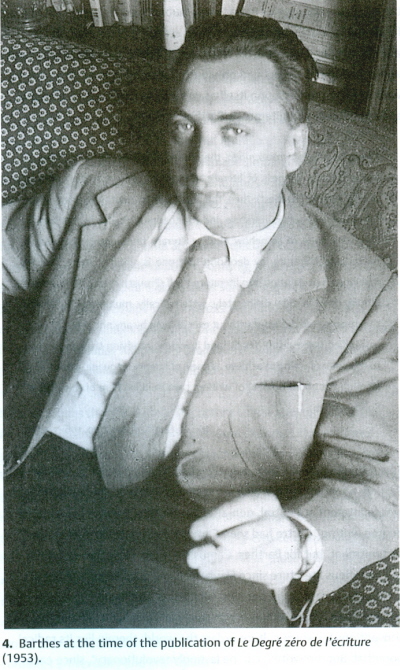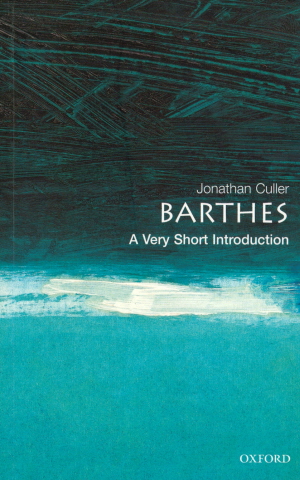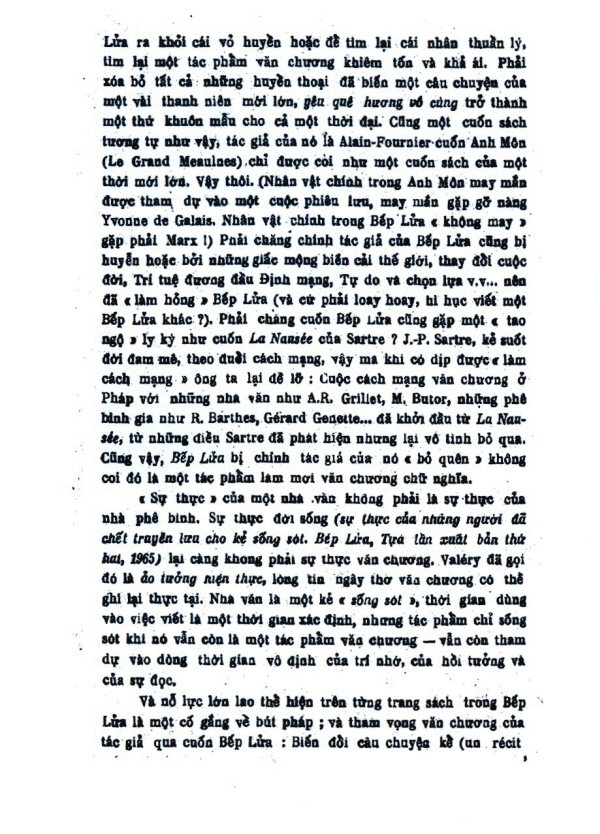
Một ông Trùm khác, của cơ cấu
luận
Barthes, là bậc
thầy, mà còn là bậc thiên tài về phê bình, và về nhiều thứ khác nữa,
liên quan
đến khá nhiều môn học nhân văn. Khủng thế. Có thể nói, đọc Barthes rất
khó,
nhất là, Gấu nhấn mạnh, nhất là đối với những người không rành các môn
học ở
bên ngoài văn chương.
Phải một thằng thợ máy Bưu Điện, như Gấu, thí dụ, mới có cơ may đọc
Barthes, ấy
là vì thuật ngữ Barthes sử dụng, dân kỹ thuật rất dễ nắm bắt, thí dụ
những từ code,
décoder, shift, connotation, dénotation...
Vào cái thời Gấu vừa mới lớn, đọc Barthes, và giới thiệu Barthes, qua
mục
thường xuyên Gấu phụ trách trên tờ Vấn Đề, có thể nói, cả một cõi Mít
Nam không
ai biết đến tên ông, đừng nói đọc ông. Bạn bè của Gấu, những đấng triết
gia thì
lại càng không đọc, vì không thể nào nắm bắt được những từ ngữ mà
Barthes sử
dụng. Mấy đấng học trò Nguyễn Văn Trung, sau gần như ông nào cũng chửi
lại
Thầy, thì chỉ quen với ngôn ngữ triết hiện sinh, nào sinh tồn, nào tha
nhân,
nào hữu thể, nào hư vô, nào âu lo, xao xuyến… làm sao hiểu nổi thuật
ngữ gốc
gác kỹ thuật, ký hiệu học, cơ cấu luận...của Barthes.
Cơ cấu luận, là từ toán học.

Preface
to this edition
When
Roland Barthes died in 1980,
he was a formidable figure on the cultural and critical scene: a
powerful
presence, a commentator on everything under the sun, and a
distinguished
eminence of an avant-garde that had radically transformed the
humanities in
general and literary studies in particular. Twenty years later, his
status has
become more enigmatic. What is Roland Barthes for us today? What sort
of author
or intellectual force? Perhaps the question should be, rather, what
Barthes
should we read and why? Barthes's longtime publisher, Seuil, has issued
his
complete works in a hefty three-volume edition of several thousand
pages, which
makes his hundreds of short, occasional pieces as available as his most
famous
books. His last book, La Chambre claire,
a provocative, idiosyncratic, personal essay on photography, is much
cited,
praised, and debated. His early Mythologies is a formative work in
cultural
studies and a reference point in debates about the nature of this
field. Many
of the books and essays in between - particularly S/Z and Le
Plaisir du texte - are read in college and university courses on
literary criticism or literary theory. Is Barthes a literary theorist?
As a
homosexual who never openly declared himself and who left only a couple
of brief
posthumous texts about his sexual life, Barthes has also provoked
interest in
the field of gay and lesbian studies. And his autobiographical Roland Barthes par Roland Barthes
remains an extraordinarily
seductive and stimulating book, one of the most engaging we have about
the
adventures of thought and writing. If only because of the question of
what to
read, the need for an assessment of Barthes and his contribution is
greater
than ever.
This book was originally
written for the Modern Masters series published by Fontana and appeared shortly after
Barthes's
death. It analyses Barthes's achievements and makes available various
Barthes
for those who can find him useful, appealing, stimulating. The range of
his
work - of his moods and modes - is so broad that there is something for
everyone here, but the key question is where can Barthes lead us, what
does his
appeal generate? For this new edition I have made only minor changes to
the
main text. both because I still stand by most of what I say here about
Barthes
and because too many interventions would risk creating an uneven text.
where
voices of youth and middle age struggled with each other. In addition
to minor
clarifications. I have inserted new bibliographical information. but
above all
I have added a final chapter on the fortunes of Barthes since his death
and an
argument about his particular value today.
Ithaca. New
York
June 2001
*
Nhiệm vụ của văn
chương, Barthes viết trong lời tựa cho tập Tiểu luận Phê bình, Essais Critiques,
thì không như
mọi người thường nghĩ, "diễn tả cái không thể diễn tả" [to express
the unexpressible] - cái này là văn chương của tâm hồn - nhưng
mà là,
"không diễn tả cái có thể diễn tả" [inexprimer
l'exprimable].
*
Khi Barthes mất vào năm 1980
ông là một
khuôn mặt dữ dằn trên sàn diễn văn hóa và phê bình: một
hiện diện
mãnh liệt, một nhà "còm" về đủ thứ dưới ánh mặt trời, một vị
chủ soái
trong vai trò tiên phong, đã biến đổi một cách triệt để những môn học
nhân văn, nói
chung, và
những nghiên cứu văn học, nói riêng.
Hai muơi năm sau, thế giá của ông trở nên bí ẩn, huyền ảo hơn.
Roland
Barthes
là cái gì đối với chúng ta bi giờ?
Một tác giả, nhưng thứ loại nào, hay là một sức mạnh trí thức?
Nhưng có lẽ nên đặt câu hỏi như thế này:
Một Roland Barthes như thế nào, là cái gì, chúng ta nên đọc, và tại sao
nên đọc?
Trong nước,
Nguyên Ngọc đã dịch
Không
độ của cách viết, nhưng Gấu tin rằng, thật khó đọc nó, nếu không có
những
giới thiệu về ông, về những tác phẩm khác, về những môn học liên quan
đến ông.
TV sẽ giới thiệu cuốn sách nhỏ bé, trên đây, của Jonathan Culler.
Barthes: Một giới thiệu cực ngắn
Tuy cực ngắn nhưng cực bảnh.
The
critic is a writer, but a
writer postponed; like the writer, he wants to be believed less because
of what
he writes than because of his decision to write it; but unlike the
writer, he
cannot sign that desire; he
remains condemned to error-to truth.
R. Barthes
Nhà phê bình là nhà văn, nhưng
nhà văn bị hoãn [hoãn, không phải hoạn]; như nhà văn, anh ta muốn được
tin tưởng về quyết tâm
viết, hơn
là về điều anh ta viết ra. Nhưng khác nhà văn, anh ta không kể ‘ký tên’
ước muốn
này. Anh ta bị kết án [như là] một lỗi lầm – so với sự thật
Roland
Barthes (1915 -1980),
écrivain et sémiologue français, fut l'un des principaux animateurs du
structuralisme et de la sémiotique en France. Du 26 octobre 1977,
lendemain de la mort de sa mère, au 15 septembre 1979, Roland Barthes a
tenu un
journal de deuil, 330 fiches pour la plupart datées, et constituées en
un
ensemble publié pour la première fois sous le titre Journal de deuil
aux
Éditions du Seuil en 2009. Pour Barthes, «l’auteur est mort»,
Autrement dit,
«la naissance du lecteur doit se payer de la mort de l’auteur». D'après
sa
compréhension des choses, l'auteur doit céder sa place au lecteur, qui
s'approprie le contenu du texte et en fait sa propre lecture. Il nous
sera
difficile, en tant que lecteurs, de séparer l'écrivain de l'homme. Si
entre-temps il est mort physiquement, il continue son existence dans la
mémoire
de nombreux vivants, principalement grâce à ses oeuvres. Notre lecture
n'en
sera pas une de réécriture du texte, mais d'écoute de ce que
l'homme-écrivain
Barthes nous révèle et nous voile de son propre deuil*.
Extraits
5 novembre 1977
Après-midi triste. Brève
course. Chez le pâtissier (futilité) j'achète un financier. Servant une
cliente, la petite serveuse dit Voilà. C'était le mot que je disais en
apportant quelque chose à maman quand je la soignais. Une fois, vers la
fin, à
demi inconsciente, elle répéta en écho Voilà (Je suis là, mot que nous
nous
sommes dit l'un à l'autre toute la vie). Ce mot de la serveuse me fait
venir
les larmes aux yeux. Je pleure longtemps (rentré dans l'appartement
insonore).
Ainsi puis-je cerner mon
deuil. Il n'est pas directement dans la solitude, l'empirique, etc.;
j'ai là
une sorte d'aise, de maîtrise qui doit faire croire aux gens que j'ai
moins de
peine qu'ils n'auraient pensé. Il est là où se redéchire la relation
d'amour,
le «nous nous aimions». Point le plus brûlant au point le plus
abstrait...
18 août 1978
L'endroit de ma chambre où
elle a été malade, où elle est morte et où j'habite maintenant, le mur
contre
lequel la tête de son lit s'appuyait j'y ai mis une icône – non par foi
– et
j'y mets toujours des fleurs sur une table. J'en viens à ne plus
vouloir
voyager pour que je puisse être là, pour que les fleurs n'y soient
jamais
fânées.
Nguồn
Barthes
nhà văn
nhà ký hiệu học Tây là một trong những người chủ xướng của chủ nghĩa cơ
cấu và
ngành ký hiệu học tại Pháp. Vào ngày 26 Tháng 10 1977, liền sau
cái chết của
bà mẹ, ông viết nhật ký tang, gồm 330 tờ ghi chú [fiches], đa số có đề
ngày tháng,
nay được tập hợp và xb lần thứ nhất với cái tít “Nhật ký tang”, nhà xb
Seuil,
2009.
Với Barthes, ‘tác giả đã chết’. Nói một cách khác “sự ra đời của
độc giả
phải được trả giá bằng cái chết của tác giả’. Theo trình tự của sự
việc, tác giả
phải nhường chỗ cho độc giả, và người này, ‘tóm lấy’ nội dung của bản
văn, làm
quen với nó, kiếm ra cách đọc của riêng mình. Thật khó cho chúng ta,
như
là những
độc giả, tách rời nhà văn ra khỏi con người. Nếu như vào một lúc nào
đó, con người
bằng xương bằng thịt, chết, nhà văn vẫn tiếp tục hiện diện
trong hồi
nhớ của rất nhiều người còn sống, chủ yếu là do tác phẩm của mình. Cái
đọc của
chúng ta không phải là cái ‘tái viết’ bản văn, mà là cái nghe, điều mà
con người-nhà
văn Barthes thố lộ cho chúng ta, và che phủ cái tang của riêng ông.
*
Nhà văn Mẽo rất mê Barthes,
là Susan Sontag. Bà viết hình như vài bài về Barthes, thí dụ: Writing
Itself: On Roland Barthe, trong Where the Stress Falls
Mới thấy trên Gió O, Đào quân dịch một bài
của Zadie Smith về
Barthes và Nabokov
Đây là dịch phẩm đầu tay của Người, chăng?
*
An
essay is an act of
imagination. It still takes quite as much art as fiction.
Suffering from 'novel nausea', Zadie Smith wonders if the essay lives
up to its
promise.
Tiểu luận là hành động của tưởng tượng. Đâu thua gì giả tưởng.
Đau nhức vì ‘buồn nôn tiểu thuyết’, Zadie Smith mơ mòng tự hỏi, liệu
tiểu luận
bảnh như là lời hứa, của chính nó?
Bà này viết essay cũng thật tuyệt cú mèo.
Gấu mê hơn nhiều, so với giả tưởng.
Cũng vậy, với Coetzee.
Bài essay đầu tiên của bà làm Gấu choáng,
viết về Greene.
Bài mới đây, về Kafka.
Bà Zadie Smith này, quá mê
EM Forster, bèn ‘viết lại’ cuốn Howards
End của Thầy, thành cuốn On Beauty, của bà, chẳng chịu ‘lạng lách’ gì
cả.
Chán thế!
Trong
bài viết về Bếp Lửa của
TTT, từ những năm 1970, Gấu nhận ra, số phận [sự thất bại] của cuốn
này, BL, 'y hệt'
cuốn La Nausée.
Susan Sontag cũng nhận ra điều
này, mắc mớ giữa Sartre và Barthes:
… Although Barthes agrees
with Sartre that the writer's vocation has an ethical imperative, he
insists on
its complexity and ambiguity. Sartre appeals to the morality of ends.
Barthes
invokes "the morality of form"- what makes literature a problem
rather than a solution; what makes literature.

Đọc Bếp Lửa
“Beyond
Criticism”: Vượt
quá phê bình
Nhà độc giả vĩ đại thì hiếm
lắm, hiếm hơn, so với nhà văn nhớn, Borges phán.
Bản thân Ngài, là một nhà độc giả nhớn. Montaigne đọc Seneca và đọc lại
chính
mình, Coleridge đọc Jacobi và Schelling....
G. Steiner: "Critic/Reader"
Giá như mà có thể thêm vô: Gấu đọc Steiner và đọc Gấu!



